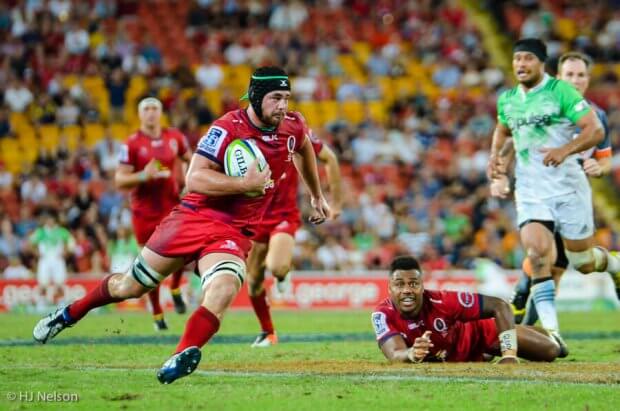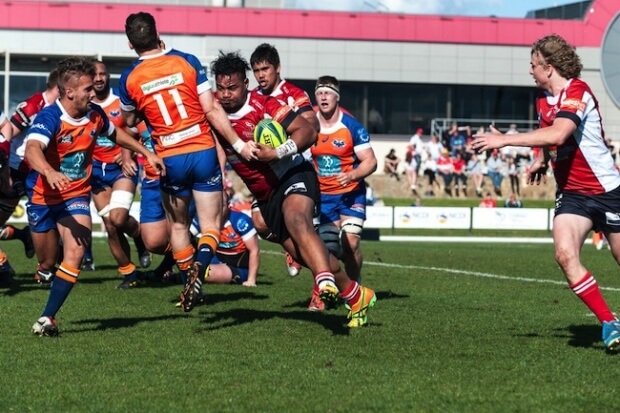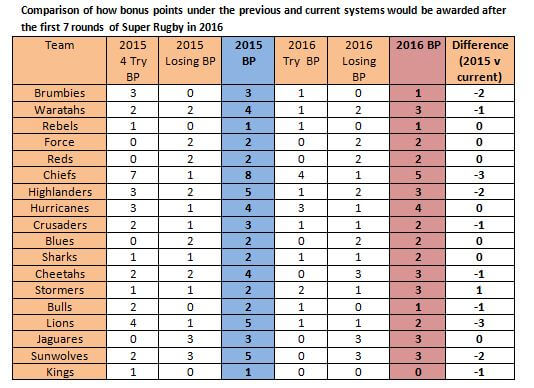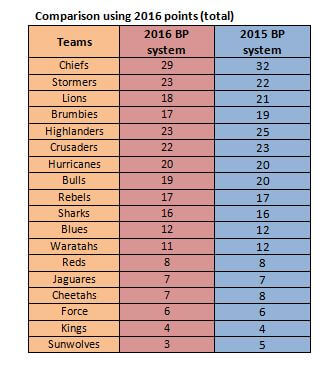This weeks Tuesday Top 5 starts out with the sad news of a forced retirement, what’s going on in Super Rugby and European news.
Ita Vaea Retires from Rugby
On Monday afternoon the Brumbies made the shock announcement that Ita Vaea would be retiring from playing rugby, effective immediately. The 27-year old said he made the decision for the benefit of himself and his family.
Vaea overcame massive challenges to make his long awaited comeback for the Brumbies last year after sitting out the entire 2013 and 2014 seasons due to a blood clot on his heart. During that time his physical activity was strictly limited to aid his recovery.
On his return in 2015 Vaea proved to be a damaging ball runner, regularly charging through the defence. His outstanding form was a huge asset to the Brumbies in their run towards the finals.
He continued his hot form into the National Rugby Championship, where he was awarded UC Vikings Player’s Player as well as Buildcorp NRC Players’ Player, which is voted on by players from all 9 NRC teams.
Just last weekend Vaea was present at the Wallabies camp, an indication of how highly he is rated by members of the Wallabies coaching staff and how close he was to achieving his dream of playing for the Wallabies in just 2 years since his return.
Ita Vaea’s Statement from the Brumbies Website:
“I am extremely disappointed to be retiring today, under these circumstances,” Vaea said.
“It has truly been an honour to represent the Brumbies over the past five years.
“While my playing career has now ended, I consider myself extremely fortunate to have met and shared experiences with special players and coaches who I can call lifelong friends.
“It will be hard watching the boys run out, but I know that this is the best decision for myself and my family.
“Coming back from this last time was something I never thought I could achieve. I am so blessed that I was given a second opportunity. Now I have to concentrate on the next chapter in my life.
“While I am not sure what is in store for the future, I know that the lessons I have learnt in rugby will serve me well.
“It is an incredible game, has given me so much more than I could have ever dreamed and I will miss it immensely.
“Thank you to everyone who has made it such a special journey.”
Vaea finishes his career with 48 Super Rugby caps and six tries (30 points). He made his debut against the Chiefs in 2011 at GIO Stadium
Not all good things take time.
So how does an 80-minute game take 2 hours to watch? It’s a question that has started to be asked over the last 3 weeks.
TV broadcasters, especially here in Australia must be growing increasingly nervous after watching games over the last 2 rounds run “long”.
Fortuitous scheduling of standalone Friday night games in round 6 between the Highlanders and Force, then in round 7 for the Blues v Chiefs has saved broadcasters thus far.
The 5:30pm (AEST) Hurricanes v Jaguares game on Saturday night was pushing into the third hour with again, fortuitous scheduling with Force game scheduled as the Australian game at 9:00pm (AEST) giving the broadcasters the buffer they needed to again avoid any issues.
The Sharks and Lions also had a crack at making the broadcaster nervous, pushing the duration envelope but just keeping it inside the broadcast scheduled window.
So why are games running so long? Injury stoppages seem to be the key reason, especially if it is a serious injury to a player, which is beyond anyone’s control. The amount of injury stoppages is another factor. There are also theories that teams may be exploiting the opportunity to use injury stoppages to slow the pace of game as a tactic.
With the amount of travel and resulting fatigue and differing climates and conditions now experienced by the players, are the stoppages for late game cramps just another part of the game and the norm?
We also need to remember the TMO reviews. The length and amount of reviews is also a significant contributing factor to the duration of games.
Have we inadvertently created this monster ourselves? In the quest to make sure there is more time for the ball in play and less wasted time, time off is blown regularly while scrums and line-outs are organised, or while players are still getting into position, all adding to the duration.
The irony of this is that the changes to increase “playing time” and stop the clock running and wasting game time are in part what has made the game duration longer.
Is it time to review the use of the TMO review? How can injury stoppages be managed better? Should players be treated off field and the game continue? Would allowing “live” substitutions allow the game to play on while a player is treated on the sideline similar to the Blood or Head-bin concept? Would allowing more substitutions (allowing players to sub on and off the field more) reduce the fatigue factor in players and reduce the injury stoppages?
In the meantime, what are the chances of having a broadcast overlap this season? There are no Friday night standalone games or time buffers between games in the coming rounds so watch out for some very succinct pre and post match introductions and interviews!
The ARU has issued a recall on it’s Anti-depressants!
With all the doom and gloom over the performances of the Aussie teams over the last few weeks it’s been tough times for most Aussie supporters, and even tougher to find something to cheer about.
With a limited diet of the Force and the Reds flying the flag for Aussie rugby over the weekend, it was reasonable to be feeling pessimistic about the potential results and for Aussie rugby for that matter and not expecting much from the games over the weekend.
The Force on Friday night showed up and were in the fight for most of the game. Off the back of a good showing against the Hurricanes the week before, they instilled some hope in their supporters and Aussie rugby in general that there is a possibility they can be competitive. Two weeks in a row against higher placed teams they have been in the game, so fingers crossed they are on the verge some winning performances – finally!
One observation about the Force’s last 2 performances that has me perplexed; Peter Grant (Mr Exciting) has been the starting 10 in both games!
The Reds (now AKA Jekyll and Hyde). This one had me checking my dosage of anti-depressants in case I had started hallucinating and double-checking it wasn’t a replay from 2011! It was the other Reds team (Hyde) that ran out on Saturday night, the one that can play! They looked different from the outset; positive, confident, like rugby players and appeared to want to be there unlike previous games.
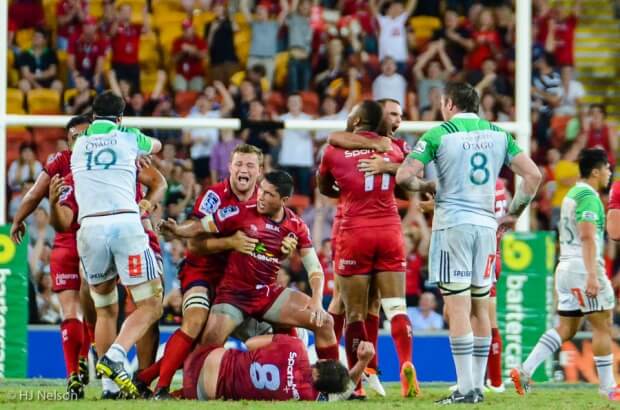
It was an impressive display in the first half really showing everything they had been missing and so far unable to do. The Reds performance in the first half showed they (team Hyde) have the players, skills and ability to be compete with most teams, it’s just about putting it together.
But then it turned. Right before our eyes “team Jekyll” appeared in the second half. The less said the better, but they had rattled the Highlanders enough and hung in there for the win.
Kudos to both the Force and Reds. Let be honest here, it has taken the Aussie teams that we had written off to find the weakness in the Kiwis game plans, get them wobbling and show that once rattled and without momentum, there are vulnerable.
The Force and Reds may be responsible for exposing the chink in the All Blacks armour that might give the Wallabies that edge we have been wishing for come Bledisloe.
Bonus Points
After 7 rounds of Super Rugby it seems like a good time to have a look at the tables and see what, if any, impact the changes in the bonus points have made.
The main change in the bonus point system was introducing a bonus point for scoring 3 tries or more than the opposition, rather than for scoring 4 or more tries, with losing bonus points still awarded for losing by a margin of 7 or less. The biggest impact this has had is it is no longer possible for teams to receive bonus points in the one match, one for losing by less than 7 and another for scoring 4 or more tries.
Looking at all of the matches so far this season and applying the bonus point system as it currently stands (BP for scoring 3 tries more than the opposition or for losing by 7 points or less) and as it was in 2015 (BP for scoring 4 tries or more and/or losing by 7 points or less) shows that there would be some variation in points for a number of teams.
The teams that are affected the most by this are those who win (and to a lesser extent lose) in high scoring matches. In the past both teams would receive 4 try bonus points, but this season many of these have been nullified by the losing team scoring within 3 tries of the winning team, for example Chiefs v Lions in round 2 where both teams scored 4 tries.
In fact the Chiefs are the team most affected by this system, as they have scored 4 tries or more in every one of their matches in 2016, but have only scored 3 more tries than their opposition in 4 out of their 7 games.
While the number of bonus points awarded would have been higher last year, it hasn’t really had an effect on the overall standings at this point of the season.
European Champions Cup
Over the weekend, the Quarter Finals of the European Champions Cup were held with some overseas Wallabies, both past and present, plus some ex-Super Rugby stars in action.
In the first of the finals, ex-All Blacks Frank Halai and Charles Piutau helped the Wasps to a 1 point win over the Exeter Chiefs, 25-24.
At Copthall Stadium, London, 5 penalties to England fly half Owen Farrell secured a 29-20 win for Saracens over Northampton Saints.
Despite Stade Francais having the majority of both possession and territory, they suffered the biggest loss of the weekend, going down 41-13 to Leicester Tigers.
In the final match of the weekend Dan Carter’s Racing 92 defeated star studded Toulon 19-16. With one try apiece it was a last minute penalty to Maxime Machenaud to seal the win for Racing.
The Semi-Finals will be held on April 23rd and 24th, with Saracens taking on Wasps and Leicester playing Racing 92.

